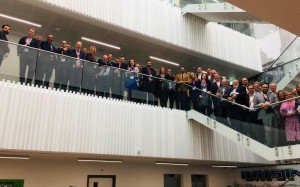The potential of hydrogen to transform the West of England’s economy, from its transport to the way its homes are heated, is to be explored by a new consortium of businesses and universities.
The group, which includes many of Bristol’s largest firms such as Airbus and EDF, was launched at an event at Bristol Airport which brought businesses together to look at hydrogen’s potential.
 Staged as part of the airport’s Festival of Clean Aviation Growth, the event focused on developing an ecosystem for hydrogen in the region – for domestic and commercial power as well as rail, road, maritime and air transport – with the strapline of Make It – Move It – Use It.
Staged as part of the airport’s Festival of Clean Aviation Growth, the event focused on developing an ecosystem for hydrogen in the region – for domestic and commercial power as well as rail, road, maritime and air transport – with the strapline of Make It – Move It – Use It.
Businesses taking part, which also included Bristol Port, global engineering consultancy Wood, construction group Costain, airline easyJet and Wales & West Utilities, as well as Bristol Airport and the GW4 Alliance of universities (Bristol, Bath, Exeter and Cardiff), agreed to collaborate to look at the possibilities for creating the infrastructure that will serve the needs of hydrogen as critical source of zero-carbon fuel in the decades ahead.
A government report published in August claimed that as much as 35% of the UK’s energy consumption could be hydrogen-based by 2050 while also creating thousands of sustainable jobs and unlocking billions of pounds of investment.
Business West, the region’s largest business group, believes the West of England is well placed to lead in areas such as transport, aviation and even production of so-called pink hydrogen, which can be generated its nuclear power plants. 
As part of the airport-led collaboration, Wood – which has an office in Bristol and employs 40,000 professionals across 60 countries – will draft a decarbonisation roadmap encompassing key regional stakeholders with the view to transform the airport into a pilot site for future aviation technologies.
This also reflects the government’s ambition to deliver a net-zero domestic aviation sector by 2040 and net-zero international aviation by 2050, as part of its Transport Decarbonisation Plan released in July.
Bristol Airport CEO Dave Lees, pictured at the event, said: “The creation of this consortium to develop an ecosystem for hydrogen in the region is a tangible product of the aerospace and aviation cluster that the airport has been proud to start up.
“Not only will it pave the way for our sector in the years ahead, but it will also serve the needs of a multitude of other requirements from running buses to heating homes.”
Katherine Bennett CBE, chair of the Western Gateway – the partnership of local authorities that stretches from Swindon via Bristol to Swansea – gave the keynote address at the event. 
She said: “I am absolutely delighted to see industries from different sectors combining to address the challenges that face us from both a carbon emissions and economic development point of view.
“We need to develop the necessary infrastructure for hydrogen and this will stimulate business across the region and create high skilled new jobs in the process.”
Bristol Airport recently announced its ambition to become Net Zero by 2030. If successful, it would be the first UK airport to do so.
It has also teamed up with easyJet, its largest operator accounting for about half of all its flights, for a series of trials using the latest cutting-edge technology and other innovations to reduce their carbon footprints.
The partnership will work with expert associates and firms in aviation to help reduce and eliminate emissions from aircraft ground operations.
Earlier this year the potential of hydrogen to spark a revolution in the West of England’s industrial base was explored at a Virtual Hydrogen Summit, the first event of its kind.
Staged by the West of England Aerospace Forum (WEAF), which represents many of the region’s aerospace and defence businesses, it looked at the potential of hydrogen as a catalyst for the development of a new industrial ecosystem, bringing together the design, test and manufacturing expertise of the region.






























